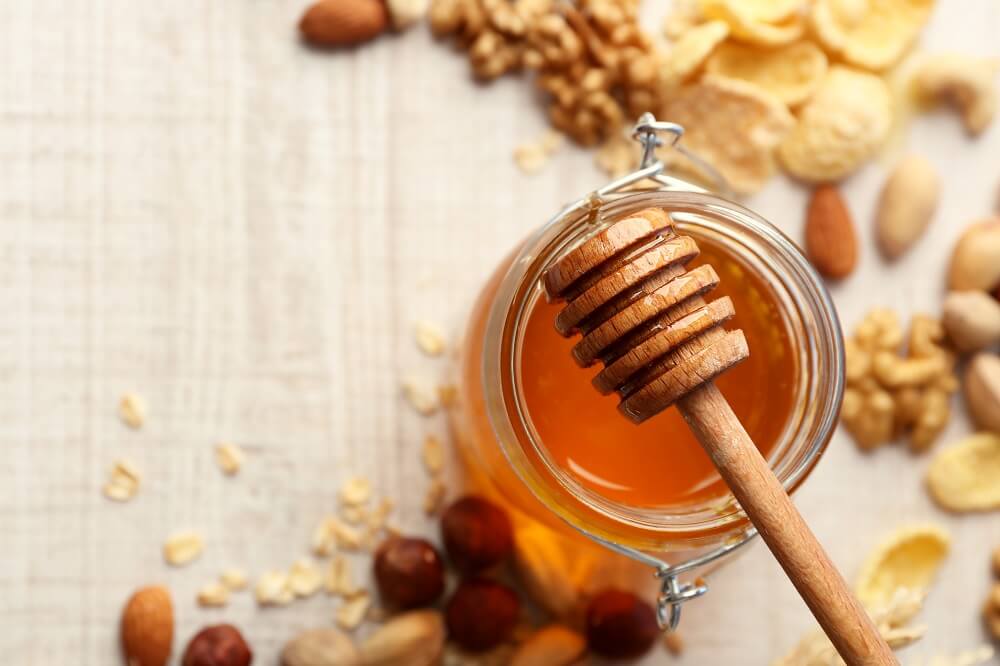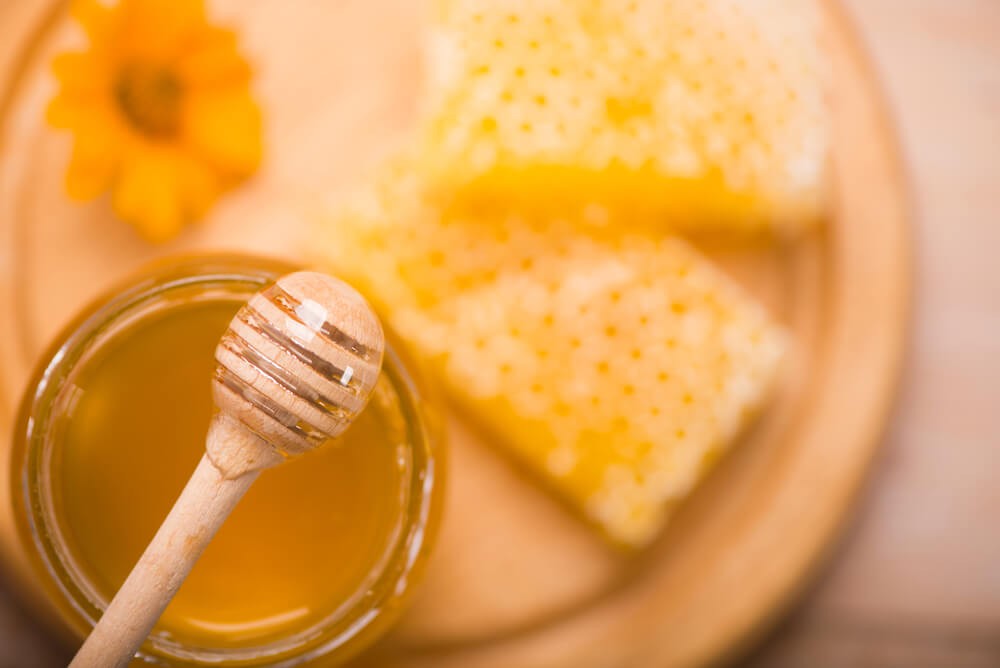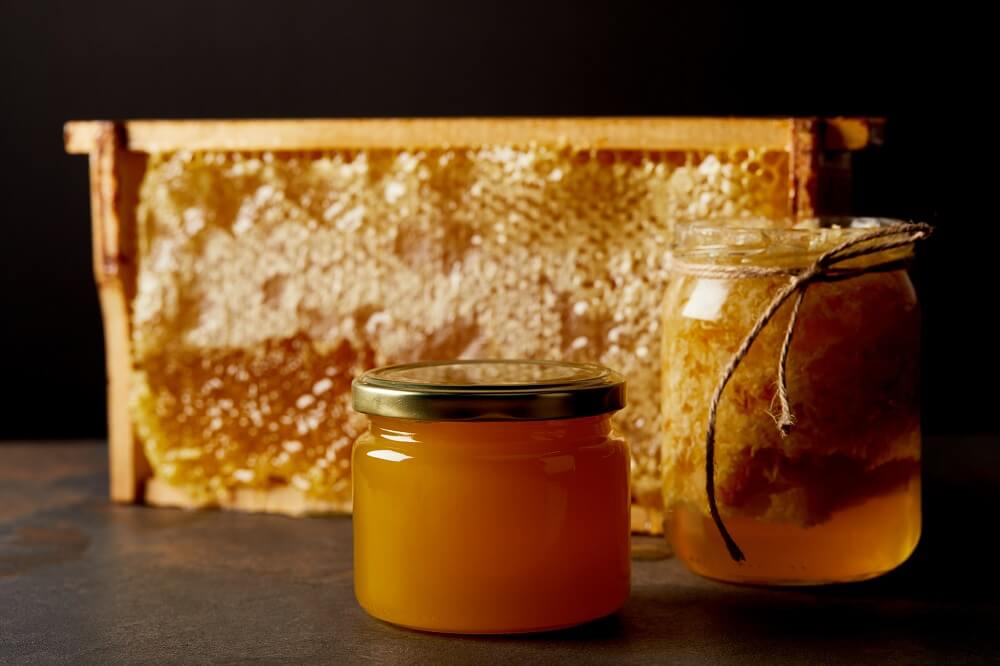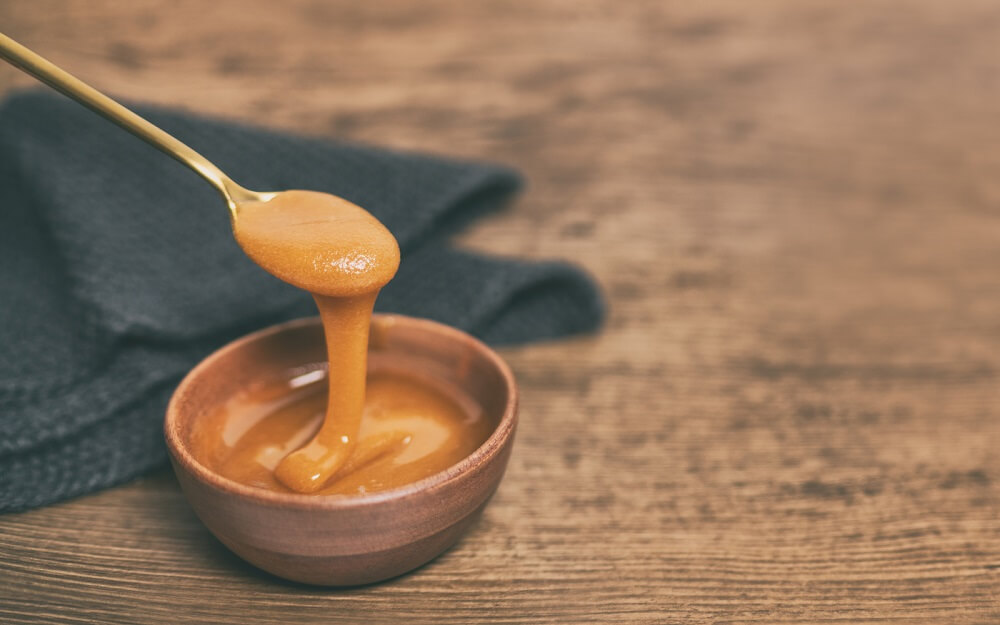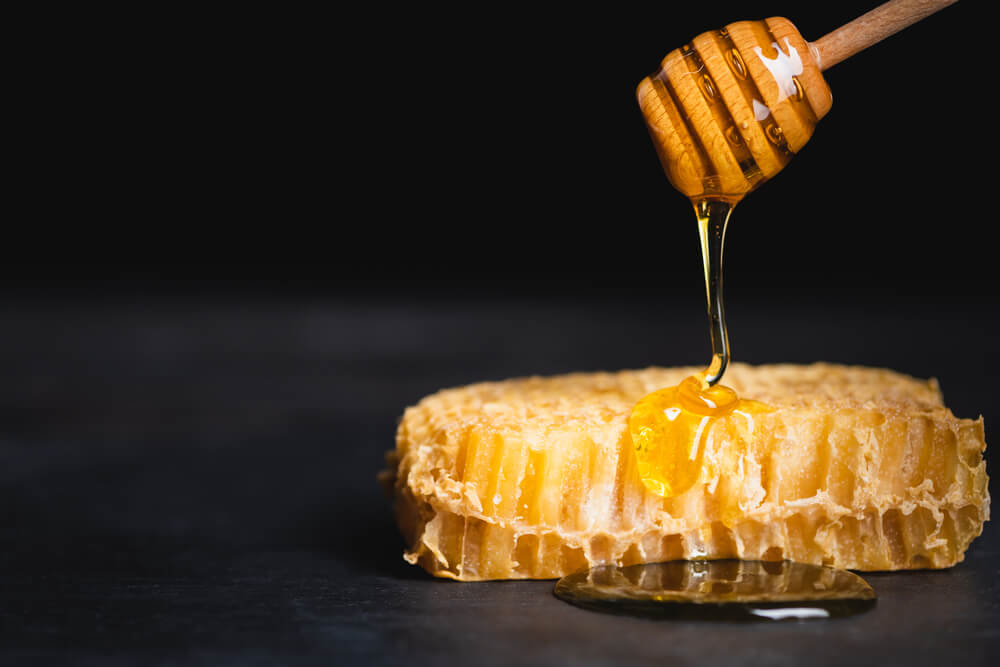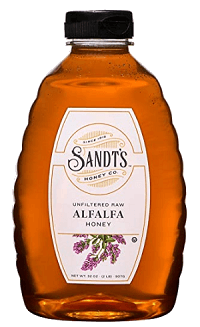Table of Contents:
What is Alfalfa Honey?
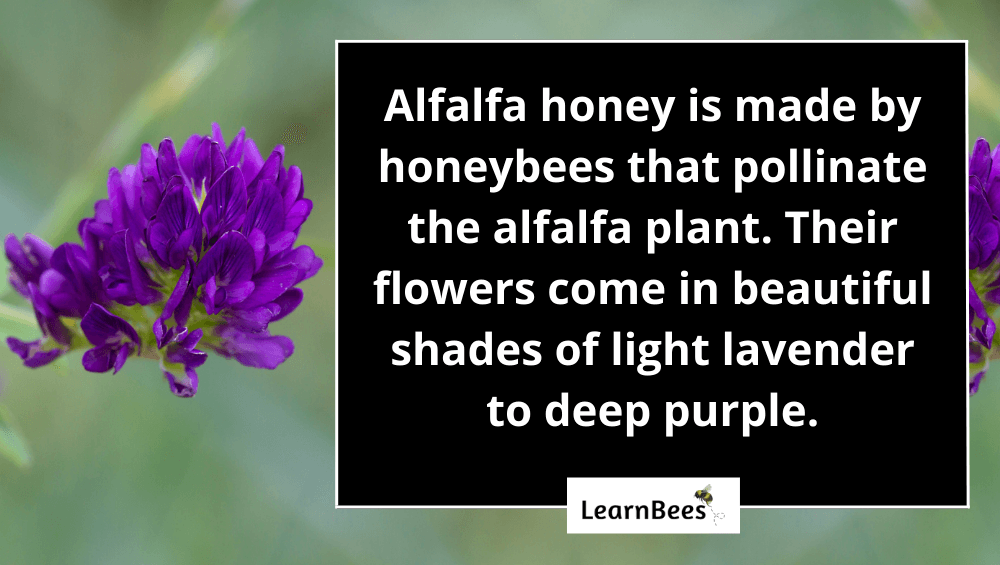
Alfalfa honey is produced by honeybees that feed on the alfalfa plant.
The alfalfa plant (Medicago sativa) is native to southwest Asia. The alfalfa plant is a very nutritious food for wildlife. In fact, the University of Kentucky calls it “the premier forage legume in the United States.”(1)
Even better?
Alfalfa honey tastes delicious.
Raw alfalfa honey has a mild sweetness with hints of vanilla.
It’s a clean and simple flavor that doesn’t overpower tea, coffee, or other foods. The taste is perfect for someone who doesn’t enjoy overly sweet honey.
But that’s not all.
Alfalfa honey tastes good straight out of the jar. A spoonful per day is a great way to reap some of the health benefits of this tasty honey.
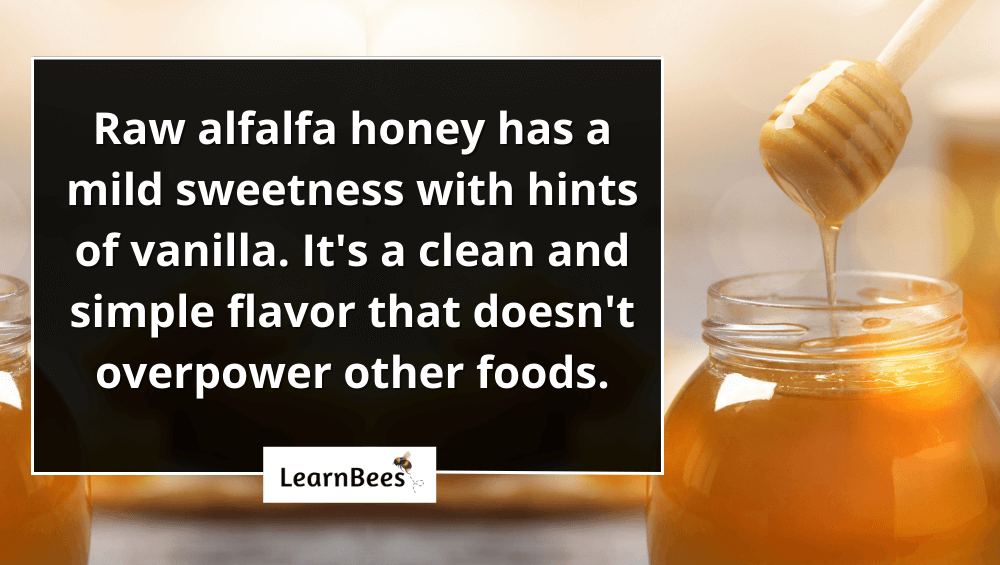
But there’s something we need to tell you first.
The health benefits of alfalfa honey only come from the raw version. Raw alfalfa honey is a superfood that’s anti-inflammatory, antibacterial, and antifungal.(2)
Raw alfalfa honey is honey that hasn’t been processed. It’s pure and left the way the honeybees made it.
But why does this matter?
Because some manufacturers process honey to the point where it’s longer meets the definition of genuine honey.
The processing of honey destroys essential antioxidants, enzymes, and nutrients. This can decrease the effectiveness of alfalfa honey in treating sore throats, coughs, and skin wounds.(3, 4)
And just as important:
Processed honey often includes artificial sweeteners like high fructose corn syrup. Because of this, the FDA doesn’t consider overly processed honey to be genuine honey.(5)
So how does this compare to raw honey?
Raw alfalfa honey hasn’t been processed, filtered, or blended with other ingredients. As a result, it contains the beneficial enzymes, antioxidants, and nutrients that make honey a superfood.
As a general guideline, find honey labels that say “raw honey.” Raw honey is far superior to the cheap honey in plastic bear containers.
What Are the Benefits of Alfalfa Honey?
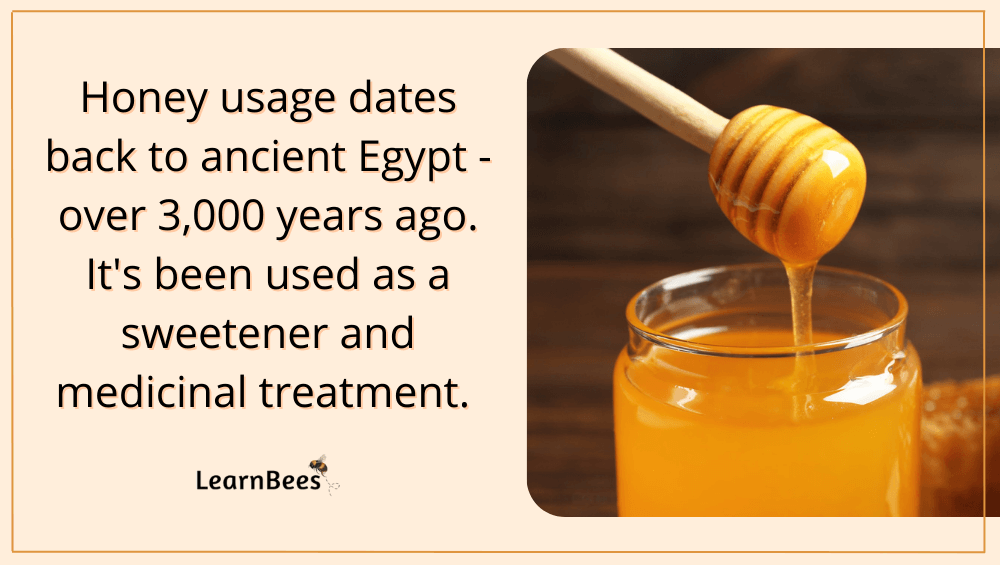
Raw honey has been used for thousands of years as a natural sweetener and medical treatment. In fact, honey usage dates back to ancient Egypt. Egyptians regularly offered honey as a gift to gods and goddesses.
Alfalfa Honey Nutrition
One tablespoon of this honey contains:
- Calories: 60 calories
- Protein: 0 grams
- Fat: 0 grams
- Carbs: 17 grams
- Sugars: 16 grams
So what are the alfalfa honey benefits?
Let’s look at a few examples.
Benefit 1: Honey is Full of Antioxidants
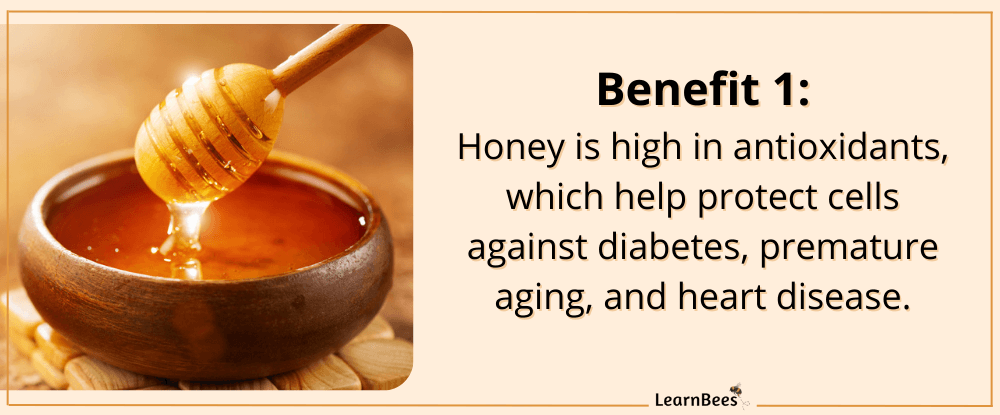
Raw honey contains antioxidants, such as flavonoids and phenolic acids, that help our bodies resist cell damage. Diabetes and heart disease are two conditions that can be caused by cell damage.(6, 7)
Honey is rich in antioxidants called flavonoids. Flavanoids can help you avoid significant chronic illnesses such as heart disease and some forms of cancer.(8, 9)
The antioxidants present in raw honey may help with oxidative stress-related illnesses.(10)
In test-tube studies, honey has been found to effectively prevent the spread of lung cancer cells.(11)
In numerous research, honey has been beneficial to the respiratory, gastrointestinal, cardiovascular, and nervous systems.(12)
Benefit 2: Honey is Antibacterial

Honey has been shown to help heal wounds and infections following surgery.(13)
Raw alfalfa honey’s antibacterial qualities may help to explain its wide range of health advantages.
Honey has chemicals that produce hydrogen peroxide over time. Hydrogen peroxide is an acid that kills bacteria by breaking down their cell walls.(14, 15)
Honey helps combat antibiotic-resistant Staphylococcus aureus and Pseudomonas aeruginosa, which are two common bacteria. According to one study, honey’s high amounts of hydrogen peroxide made it effective against these bacteria.(16)
Benefit 3: Honey Provides Heart Health Benefits
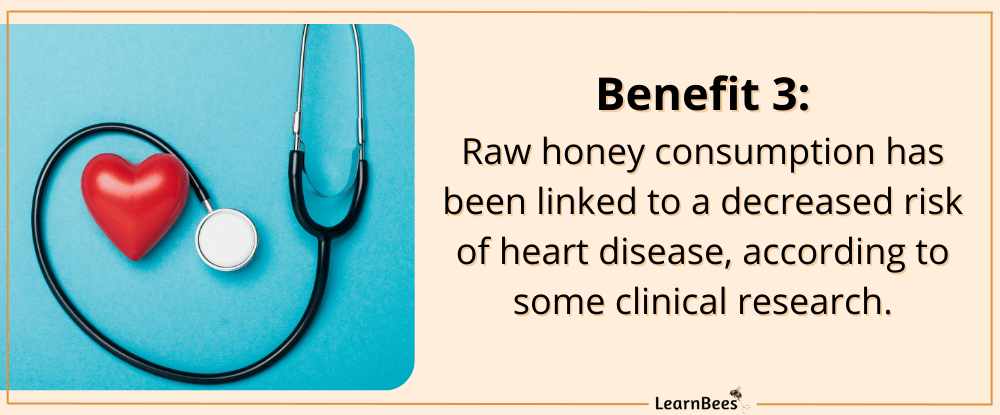
In numerous studies, honey has been linked to a decreased risk of heart disease.
In one study of 4,500 people, honey consumption was associated with a decreased risk of high blood pressure.(17)
According to some studies, honey has beneficial effects on blood fat levels, heart function, and blood pressure.(18)
In a study on rats, honey protected the heart against oxidative stress.(19)
Raw honey also contains propolis, a resin produced by honeybees from sap-producing trees. Propolis has triglyceride-lowering and cholesterol-lowering effects.(20)
Benefit 4: Honey Can Help with Sore Throats and Coughs

Coughing is a common symptom among children who suffer from respiratory infections, and it may disturb both the child’s sleep and parent’s sleep.
Fortunately, raw honey may be a suitable alternative to traditional cough medicines, according to research.(21)
According to one study, honey is more successful than diphenhydramine (a cough medication ingredient) in suppressing cough symptoms.(22)
Honey may also help to reduce the duration of coughs.
Various research has shown that honey may help with upper respiratory infections.(23)
Raw honey has been shown to help parents and children sleep better when dealing with coughs.(24)
Unlike some cough medications, honey doesn’t have any side effects. However, honey should not be given to babies under one year because of the risk of infant botulism.(25)
What Are the Risks of Alfalfa Honey?
The majority of people can safely eat alfalfa honey without any problems.
However, you should be aware of the following side effects:
Risk 1: Honey Can Cause Problems for Babies under 12 Months Old

Honey is not recommended for infants due to the risk of infant botulism.
Botulism is an uncommon but serious illness caused by Clostridium botulinum bacteria. Botulism affects the nervous system and can lead to respiratory failure and paralysis.
Honey is a common cause of infant botulism. Because infants have not yet developed a mature immune system, they cannot combat the bacteria.
Once the child is older than 12 months, they can safely consume honey.
Risk 2: Honey May Raise Blood Sugar Levels in Diabetics

In individuals with diabetes, alfalfa honey may raise blood sugar levels.
While alfalfa honey does have several health benefits, bear in mind that it also contains sugar and carbohydrates. People with diabetes must watch their carbohydrates, especially while taking insulin.
Honey and sugar should be consumed in moderation since they cause blood sugar levels to rise.
FAQs on Alfalfa Honey
- Is alfalfa honey good for allergies?
- What color is alfalfa honey?
- Do honeybees like alfalfa?
- How do you take alfalfa honey?
- Is alfalfa honey safe?
- Is alfalfa honey beneficial to the skin?
- Is alfalfa honey vegan?
- What is the taste of alfalfa honey?
- Is alfalfa honey pure honey?
- Where can I buy alfalfa honey?
- Does alfalfa honey crystallize?
- What is alfalfa honey good for?
- Is alfalfa honey in tea good?
- Does alfalfa honey come from bees?
- Can you buy alfalfa honey with honeycomb?
- Can alfalfa honey be used for weight loss?
- What is the difference between clover honey and alfalfa honey?
Is alfalfa honey good for allergies?
Honey hasn’t been scientifically shown to be an effective allergy treatment, but the idea isn’t far-fetched. Honey is known for its anti-inflammatory effects.
Many people believe raw honey is good for allergies because it contains traces of flower pollen. Repeated exposure to minor dosages of allergens is a common treatment for allergies.
But if you’re interested in using honey as an allergy treatment, always speak to your doctor first.
—> Go back to the FAQs on alfalfa honey
More to Explore:
What color is alfalfa honey?
Alfalfa honey is a light-colored honey. The color can range from white to light amber.
—> Go back to the FAQs on alfalfa honey
More to Explore:
Do honeybees like alfalfa?
Yes, honeybees love alfalfa. Alfalfa nectar has been discovered to be a significant food source for honeybees. It appears that deep-rooted alfalfa plants provide nectar and pollen when other sources, such as clovers and goldenrod plants, are dried up.
—> Go back to the FAQs on alfalfa honey
More to Explore:
- The Top 3 Best Manuka Honey Brands
- Orange Blossom Honey: Uses, Benefits, & Risks
- Sourwood Honey: Uses, Benefits, & Risks
How do you take alfalfa honey?
You can take alfalfa honey by the spoonful or add it to tea or coffee. Some people also like to use it as a natural sweetener in recipes. Alfalfa honey pairs well with cheese, so it’s often used as a condiment for cheese plates.
You can also drizzle alfalfa honey over toast, oatmeal, or yogurt.
—> Go back to the FAQs on alfalfa honey
More to Explore:
Is alfalfa honey safe?
Yes, alfalfa honey is safe for most people to eat. However, infants under the age of 12 months should not eat honey due to the risk of infant botulism. People with diabetes should also know that alfalfa honey may raise blood sugar levels.
—> Go back to the FAQs on alfalfa honey
More to Explore:
- The Brutally Honest Truth About Sour Honey
- Buckwheat Honey: Uses, Benefits, & Risks
- Can You Eat Honeycombs?
Is alfalfa honey beneficial to the skin?
Alfalfa honey is often used in natural beauty products because of its skin-benefiting properties. Honey is a natural humectant, meaning it helps the skin retain moisture. It’s also an anti-inflammatory agent, which can help soothe irritated skin.
—> Go back to the FAQs on alfalfa honey
More to Explore:
Is alfalfa honey vegan?
No, alfalfa honey is not vegan. Honeybees make honey from the nectar of flowers. Vegans don’t eat or use animal products, so they don’t use honey.
—> Go back to the FAQs on alfalfa honey
More to Explore:
What is the taste of alfalfa honey?
People frequently ask, “What does alfalfa honey taste like?”
Alfalfa honey is a light-colored honey with a mild flavor. It’s not as sweet as some other types of honey, like tupelo honey. It has hints of vanilla with slightly grassy undertones.
—> Go back to the FAQs on alfalfa honey
More to Explore:
Is alfalfa honey pure honey?
It depends on whether the honey is raw or processed. Raw honey is honey that hasn’t been heated or filtered. It’s straight from the hive and contains all of the pollen, enzymes, and other beneficial compounds found in honey.
Processed or commercial honey has been heated and filtered. This removes impurities but also some of the beneficial compounds found in honey.
So, if you’re looking for pure alfalfa honey, make sure to buy raw honey.
—> Go back to the FAQs on alfalfa honey
More to Explore:
Where can I buy alfalfa honey?
Alfalfa honey is available at some natural food stores. You can also buy it online or get it from a local beekeeper. The critical thing to remember is that you want honey that says “raw” on the label. This means it hasn’t been heated or filtered and still contains all of the beneficial compounds found in honey.
—> Go back to the FAQs on alfalfa honey
More to Explore:
Does alfalfa honey crystallize?
Yes, alfalfa honey will crystallize over time. This is because it contains more glucose than fructose. You can still use crystallized honey, but you’ll need to heat it first to liquefy it.
—> Go back to the FAQs on alfalfa honey
More to Explore:
- Fermented Garlic and Honey Recipe
- What’s the Difference Between Raw and Organic Honey?
- Beeswax on Hair: Benefits, Risks, & How to Use It
What is alfalfa honey good for?
People often ask, “Is alfalfa honey good for you?”
The short answer is yes. Alfalfa honey contains vitamins, enzymes, and antioxidants that can offer some health benefits.
For example, honey has been shown to help with wound healing and skin conditions. People suffering from eczema or psoriasis may find relief by using products that contain honey.
Honey has also been shown to effectively treat respiratory infections, such as coughs and colds. This is likely due to honey’s anti-inflammatory and antibacterial properties.
—> Go back to the FAQs on alfalfa honey
More to Explore:
- What is Longan Honey?
- Do Honey Pasteurization Ruin Honey?
- Allergic to Honey: Signs of a Honey Allergy + Treatment
Is alfalfa honey in tea good?
Alfalfa honey in tea is a great way to enjoy the benefits of honey. Simply add a spoonful of honey to your tea and enjoy. The honey will quickly dissolve and blend well into the hot tea.
—> Go back to the FAQs on alfalfa honey
More to Explore:
- Honey for Skin Benefits: Directions, Uses, & Risks
- 8 Scientific Benefits of Raw Honey
- Beeswax vs. Soy Wax: Which is Better for Candle Making?
Does alfalfa honey come from bees?
Yes, alfalfa honey is made by honeybees from the nectar of alfalfa flowers. The bees collect the nectar and store it in their hive. Once the nectar is stored in the hive, enzymes from the bees’ saliva mix with the nectar and turn it into honey.
From there, the honeybees seal the honey in the hive with a wax cap. Once the honey is sealed, it doesn’t spoil and can be stored until the bees need it during the winter.
—> Go back to the FAQs on alfalfa honey
More to Explore:
Can you buy alfalfa honey with honeycomb?
Yes, you can buy alfalfa honey with honeycomb. This type of honey is called “cut comb” honey. It’s simply honey that still contains the beeswax comb.
The comb is edible. Some people prefer to eat the comb along with the honey, while others prefer to remove it.
—> Go back to the FAQs on alfalfa honey
More to Explore:
Can alfalfa honey be used for weight loss?
Honey isn’t recommended for weight loss because it’s full of sugars and carbs. If you’re trying to lose weight, you may want to limit your honey intake.
—> Go back to the FAQs on alfalfa honey
More to Explore:
- Honey For Allergies: Is it a Potential Cure?
- Cinnamon Honey: Are There Health Benefits?
- How Many Carbs Are in Honey?
What is the difference between clover honey and alfalfa honey?
The main difference is that clover honey is made from the nectar of clover flowers, while alfalfa honey is made from the nectar of alfalfa flowers. This results in different tastes between the two kinds of honey.
Clover honey has a sweet and floral taste without any bitterness. Alfalfa honey is typically less sweet, with subtle notes of vanilla. Depending on the jar of alfalfa honey, some people say it can be slightly bitter or grassy.
Both types of honey are usually lightly colored. They can range from white to light golden or amber.
Between the two, clover honey is more popular than alfalfa honey.
